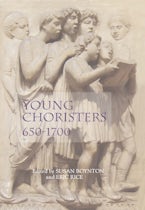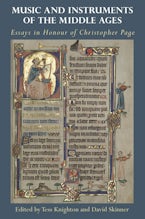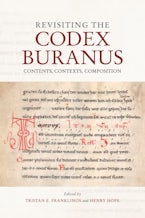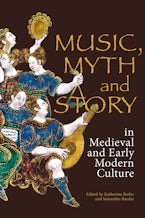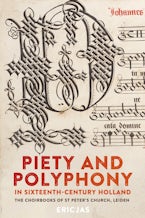
Title Details
351 Pages
23.4 x 15.6 cm
2 colour, 17 b/w illus.
Series: Studies in Medieval and Renaissance Music
Series Vol. Number:
16
Imprint: Boydell Press
The Montpellier Codex
The Final Fascicle. Contents, Contexts, Chronologies
- Description
- Contents
- Reviews
The final section of the Montpellier Codex analysed in full for the first time, with major implications for late-medieval music.
The Montpellier Codex (Bibliothèque interuniversitaire, Section Médecine, H.196) occupies a central place in scholarship on medieval music. This small book, packed with gorgeous gold leaf illuminations, historiated initials, and exquisite music calligraphy, is one of the most famous of all surviving music manuscripts, fundamental to understandings of the development of thirteenth- and fourteenth-century polyphonic composition. At some point in its historyan eighth section (fascicle) of 48 folios was appended to the codex: when and why this happened has long perplexed scholars. The forty-three works contained in the manuscript's final section represent a collection of musical compositions, assembled at a complex moment of historical change, straddling the historiographical juncture between the thirteenth and fourteenth centuries.
This book provides the first in-depth exploration of the contents and contexts of the Montpellier Codex's final fascicle. It explores the manuscript's production, dating, function, and notation, offering close-readings of individual works, which illuminate compositionally progressive features of therepertoire as well as its interactions with existing musical and poetic traditions, from a variety of perspectives: thirteenth- and fourteenth-century music, art history, and manuscript culture.
CATHERINE A. BRADLEY isan Associate Professor at the University of Oslo; KAREN DESMOND is Assistant Professor of Music at Brandeis University.
Contributors: Rebecca A. Baltzer, Edward Breen, Sean Curran, Rachel Davies, Margaret Dobby, Mark Everist, Solomon Guhl-Miller, Anna Kathryn Grau, Oliver Huck, Anne Ibos-Augé, Eva M. Maschke, David Maw, Dolores Pesce, Alison Stones, Mary Wolinski
The Montpellier Codex (Bibliothèque interuniversitaire, Section Médecine, H.196) occupies a central place in scholarship on medieval music. This small book, packed with gorgeous gold leaf illuminations, historiated initials, and exquisite music calligraphy, is one of the most famous of all surviving music manuscripts, fundamental to understandings of the development of thirteenth- and fourteenth-century polyphonic composition. At some point in its historyan eighth section (fascicle) of 48 folios was appended to the codex: when and why this happened has long perplexed scholars. The forty-three works contained in the manuscript's final section represent a collection of musical compositions, assembled at a complex moment of historical change, straddling the historiographical juncture between the thirteenth and fourteenth centuries.
This book provides the first in-depth exploration of the contents and contexts of the Montpellier Codex's final fascicle. It explores the manuscript's production, dating, function, and notation, offering close-readings of individual works, which illuminate compositionally progressive features of therepertoire as well as its interactions with existing musical and poetic traditions, from a variety of perspectives: thirteenth- and fourteenth-century music, art history, and manuscript culture.
CATHERINE A. BRADLEY isan Associate Professor at the University of Oslo; KAREN DESMOND is Assistant Professor of Music at Brandeis University.
Contributors: Rebecca A. Baltzer, Edward Breen, Sean Curran, Rachel Davies, Margaret Dobby, Mark Everist, Solomon Guhl-Miller, Anna Kathryn Grau, Oliver Huck, Anne Ibos-Augé, Eva M. Maschke, David Maw, Dolores Pesce, Alison Stones, Mary Wolinski
Introduction
Montpellier 8: Anatomy of... - Mark Everist
A palaeographical analysis of the verbal text in Montpellier 8: problems, implications, opportunities - Sean Curran
The style and iconography of Mo folio 350 - Alison Stones
The decoration of Montpellier Fascicle 8: its place in the continuum of Parisian manuscript illumination - Rebecca Baltzer
Double motet layouts in the Montpellier Codex and contemporaneous Libri motetorum - Oliver Huck
Deus in adiutorium revisited: sources and contexts - Eva M. Maschke
Thematic clusters and compilational strategies in Mo 8 - Anna Kathryn Grau
Texture, rhythm, and stylistic groupings in Montpellier's eighth fascicle motets - Karen Desmond
'Je le temoin en mon chant': The art of diminution in the Petronian triplum - David Maw
How rhythmically innovative is the eighth fascicle of the Montpellier Codex? - Mary Wolinski
Re-presentation in the Ars antiqua: from chant to polyphony - Solomon Guhl-Miller
'[.] Que ne dit "cief bien seans"': Quoting Motets in Mo 8 - Anne Ibos-Augé
Montpellier, Fascicle 8 PORTARE Motets and tonal exploration - Dolores Pesce
Repetitions, rhythmical evolution, and rhetoric in the Montpellier Codex - Margaret Dobby
Shedding light on Mo 8,304: Alma virgo virginum/Benedicta es, Maria - Rachel Davies
A performance and reception history of On parole/A Paris/FRESE NOUVELE - Edward George Breen
Montpellier 8: Anatomy of... - Mark Everist
A palaeographical analysis of the verbal text in Montpellier 8: problems, implications, opportunities - Sean Curran
The style and iconography of Mo folio 350 - Alison Stones
The decoration of Montpellier Fascicle 8: its place in the continuum of Parisian manuscript illumination - Rebecca Baltzer
Double motet layouts in the Montpellier Codex and contemporaneous Libri motetorum - Oliver Huck
Deus in adiutorium revisited: sources and contexts - Eva M. Maschke
Thematic clusters and compilational strategies in Mo 8 - Anna Kathryn Grau
Texture, rhythm, and stylistic groupings in Montpellier's eighth fascicle motets - Karen Desmond
'Je le temoin en mon chant': The art of diminution in the Petronian triplum - David Maw
How rhythmically innovative is the eighth fascicle of the Montpellier Codex? - Mary Wolinski
Re-presentation in the Ars antiqua: from chant to polyphony - Solomon Guhl-Miller
'[.] Que ne dit "cief bien seans"': Quoting Motets in Mo 8 - Anne Ibos-Augé
Montpellier, Fascicle 8 PORTARE Motets and tonal exploration - Dolores Pesce
Repetitions, rhythmical evolution, and rhetoric in the Montpellier Codex - Margaret Dobby
Shedding light on Mo 8,304: Alma virgo virginum/Benedicta es, Maria - Rachel Davies
A performance and reception history of On parole/A Paris/FRESE NOUVELE - Edward George Breen
"A notable strength of the volume is the explicit connections its contributors draw between chapters . . . [which] both aid readers in spotting areas of complementarity or contradiction and give the impression of a lively community of scholars in conversation with one another. . . . Will likely be of greatest interest to scholars working on thirteenth-and early fourteenth-century polyphony and to graduate students familiar with the repertoire and period. . . . [T]his volume will provide a welcome new resource sure to be useful for years to come." Flannery Cunningham, MANUSCRIPT STUDIES
"[A]n illuminating and engaging volume, with discoveries not only beneficial for early musicologists, experts, and performers, but also for connoisseurs of early music and others curious about the traditions, transmission, and performance of music in Medieval France." Samantha Bassler, EARLY MUSIC AMERICA
"[T]he volume features ample dialogue and healthy disagreement among authors, and cross-references abound, all marks of a well-planned, carefully executed collection of essays. The book will assuredly spark further scholarship on this monumental manuscript while simultaneously serving as a go-to resource for decades to come." SPECULUM
"A rich and varied crop of compelling scholarship, admirably executed and skilfully assembled by some of the finest minds now working on the music of the thirteenth and early fourteenth centuries." PLAINSONG & MEDIEVAL MUSIC
Hardcover
9781783272723
February 2018
£95.00 / $140.00
Ebook (EPDF)
9781787441828
February 2018
£24.99 / $29.95
Title Details
351 Pages
2.34 x 1.56 cm
2 colour, 17 b/w illus.
Series: Studies in Medieval and Renaissance Music
Series Vol. Number:
16
Imprint: Boydell Press




